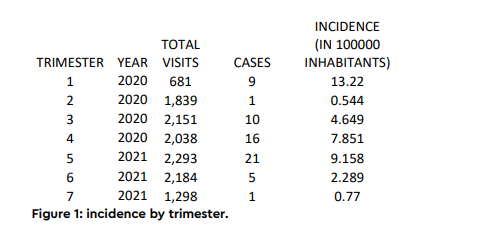Impact of COVID-19 in cancer patients: Analysis of the first 20 months in 13 Spanish Centers
PO-1070
Abstract
Impact of COVID-19 in cancer patients: Analysis of the first 20 months in 13 Spanish Centers
Authors: Sigfredo Romero1, Elena Moreno2, Vladimir Suarez2, Daniela Gonsalves2, Alejando De La Torre-Luque3, Escarlata Lopez2
1GenesisCare, Radiation Oncology, Talavera de la Reina, Spain; 2GenesisCare, Radiation Oncology, Madrid, Spain; 3Center for Online Biomedical Research in Mental Health (CIBERSAM), Department of Legal Medicine, Psychiatry and Pathology, Madrid, Spain
Show Affiliations
Hide Affiliations
Purpose or Objective
· To analyse incidence of
COVID-19 in patients across different Spain centers.To
study the impact of treatment interruptions in Colorectal, Head & Neck,Lung,Urological, Gynecological, Breast, lymphomas and metastases cancers.
Material and Methods
A retrospective, observational and multicenter
study was carried out in 13 medical centers. We recollected through the records
of notification to the COVID-19 committee (suspected patients or confirmed, in
treatment or about to start) from January 2020 to September 1, 2021 (20
months). Besides to the sociodemographic
data collected, information related to the treatment and location of the tumor
was recorded, grouped into 6 different groups: head and neck, chest (breast and
lymphoma), lung, urological, abdomen (rectum, gynecological and superior
abdomen) and metastasis.We compiled the temporary or definitive
interruption in treatments. A univariate analysis and Cox regressions was
performed between treatment interruption and sociodemographic (sex, age) and
treatment-related factors (tumor site, radiotherapy intention and sequence,
systemic treatment).Different waves were defined during the pandemic: 1st wave from January to March 2020; 2nd wave, from
September to December 2020; 3rd wave, from January to March 2021; 4rth wave,
from April to May 2021; 5th wave, from June to August 2021.

Results
12,484 first consultations were visited from
January 2020 to August 2021 in 13
centers. 63 (0.005%) patients were included in the study (42.86% women, mean
age= 66.94, SD = 9.67).Incidence
rate was 5.05/100,000 inhabitants. As a result, the highest incidence
reported, were in the first wave (13.22) and in the third wave (9.16). (figure
1). The highest incidence rate was in Madrid centers (46.03%). COVID-19 disease
was confirmed by a positive PCR test in 63.46% patients.The relationship between radiotherapy sequence
and interruption risk was endorsed, observing higher risk of treatment
interruption in patients with concomitant treatment (p < .05). On the
other hand, Cox regression revealed a significant relationship between age (OR
= 0.94, p < .05). Patients with temporary suspension had a mean age of 65.12 (sd =
8.64) and those who did not have temporary suspension, mean age = 67.41 (sd =
9.93).Finally,
patients with gynecological or rectal cancers showed higher risk of temporary
treatment in interruption comparison to those with breast or hematological
cancers (OR = 7.58, p < .05).
Conclusion
COVID-19 incidence has been very low across our centers, with an incidence rate of 5.05 per 100,000 inhabitants. The results showed a temporal interruption of treatment with radiotherapy and/or chemotherapy in younger patients, and both the temporary and definitive interruption of oncological treatment were more frequent in the group of patients receiving concomitant treatment. Pathologies with less hypofractionated treatment schemes (gynecological and rectum) have a higher risk of interruption.